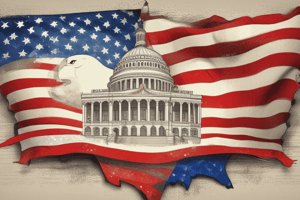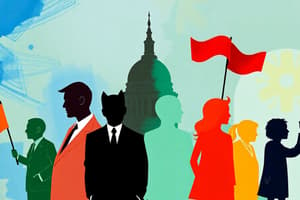Podcast
Questions and Answers
What is meant by 'universal adult franchise'?
What is meant by 'universal adult franchise'?
Universal adult franchise means that all adults in the country are allowed to vote.
How were voting rights restricted in the earliest forms of government?
How were voting rights restricted in the earliest forms of government?
In the earliest forms of government, only men who owned property and were educated were allowed to vote.
Who was determined to change the unfair voting practices in India before independence?
Who was determined to change the unfair voting practices in India before independence?
Several people, including Gandhiji (Mahatma Gandhi), were determined to change the unfair voting practices.
What practice is exemplified by applying a mark on a voter's finger?
What practice is exemplified by applying a mark on a voter's finger?
What unfair practice did Gandhiji criticize in his journal 'Young India'?
What unfair practice did Gandhiji criticize in his journal 'Young India'?
What was one of the criteria for voting eligibility in the earliest forms of government?
What was one of the criteria for voting eligibility in the earliest forms of government?
Why was the early voting system considered unfair?
Why was the early voting system considered unfair?
What change did Gandhiji and others seek in the voting rights system in India?
What change did Gandhiji and others seek in the voting rights system in India?
What democratic principle ensures that all adults in a country can vote?
What democratic principle ensures that all adults in a country can vote?
How did early voting restrictions impact the governance of a country?
How did early voting restrictions impact the governance of a country?
Flashcards are hidden until you start studying
Study Notes
What is Government?
- The government is responsible for making decisions and taking actions on various aspects of life, such as building roads and schools, reducing prices of essential items, increasing electricity supply, and providing aid during natural disasters.
- It also runs postal and railway services, ensures access to good health facilities, and maintains peaceful relations with other countries.
Roles of Government
- Protects the country's boundaries
- Ensures access to good health facilities
- Provides aid during natural disasters
- Manages social issues, such as poverty, through various programs
- Runs postal and railway services
Institutions of Government
- The Supreme Court
- Indian Railways
- Bharat Petroleum
Levels of Government
- Local level: village, town, or locality
- State level: covers an entire state
- National level: the entire country
Laws and Governance
- The government makes laws that everyone must follow
- Laws are enforced through punishments, such as fines or imprisonment, for non-compliance
- People can take action if they feel a law is not being followed, such as approaching the court
Types of Government
- Democracy: people elect representatives to make decisions and enforce laws
- Monarchy: a king or queen has absolute power to make decisions and run the government
Democratic Governments
- India is a democracy, where people have the power to elect their leaders
- The main feature of a democracy is that people have the power to participate in decision-making
- In representative democracies, people choose their representatives through elections, who then make decisions on their behalf
Women's Suffrage
- The women's suffrage movement fought for women's right to vote
- During World War I, women took on men's work, challenging stereotypes and demanding equal rights
- American women got the right to vote in 1920, while UK women got to vote on equal terms as men in 1928
Universal Adult Franchise
- All adults in a country have the right to vote
- In the past, only men who owned property and were educated were allowed to vote, excluding women, the poor, and the uneducated
- Gandhiji demanded universal adult franchise, calling for all adults to have the right to vote
Studying That Suits You
Use AI to generate personalized quizzes and flashcards to suit your learning preferences.




